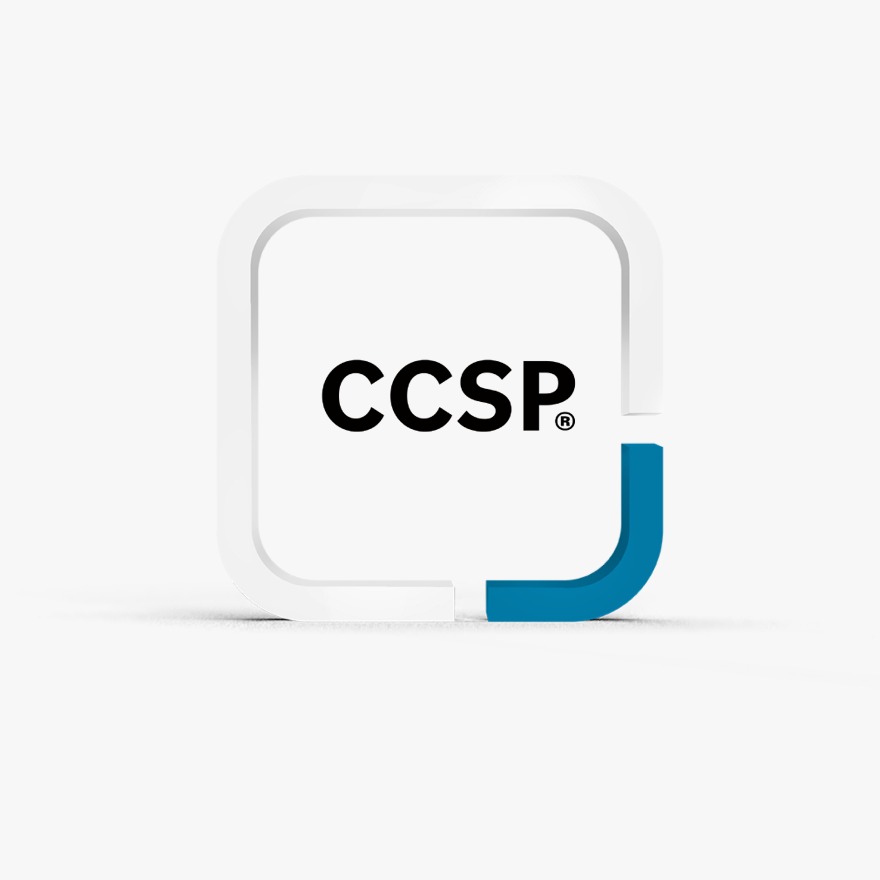Certified Cloud Security Professional 12-01-2023

Date
Dec 1, 2023 - Jan 1, 2024
Venue
Online - Self paced learning
Trainer
Online
Summary
Prerequisites
- Candidates must have a minimum of five years cumulative, full-time experience in information technology. Three years must be in information security, and one year must be in one or more of the six domains of the current CCSP Detailed Content Outline (DCO). Earning a post-secondary degree (bachelors or masters) in computer science, information technology (IT) or related fields may satisfy up to one year of the required experience. Earning an additional credential from the ISC2 approved list may be substituted for one year of experience in one or more of the six domains of the CCSP DCO. An active CISSP credential may be substituted for the entire CCSP experience requirement. Part-time work and internships may also count towards the experience requirement.
Exam Deails
- Length of exam 4 hours
- Number of items 150
- Item format Multiple choice
- Passing grade 700 out of 1000 points
- Exam language availability English,
- Testing center Pearson VUE Testing Center
Who benefits?
- Cloud Architect
- Cloud Engineer
- Cloud Consultant
- Cloud Administrator
- Cloud Security Analyst
- Cloud Specialist
- Auditor of Cloud Computing Services
- Professional Cloud Developer
Learning Goals
ATC Training - Exclusive Benefits
Attendee Workbook
Workbook to keep fornotes and examples
2 years Membership
Two years of membership to theScrum Alliance Community
Certificate of Course Completion
Certification to keep showingcompletion of course
Eligibility for Scrum Exam
FAQ
What is the annual renewal fee?
Renewing your CCSP (Certified Cloud Security Professional) certification is an important step to demonstrate your commitment to staying current in the field of cloud security and maintaining the value of your certification. CCSP certification renewal typically occurs every three years. Here are the common steps and requirements for renewing your CCSP certification:
Continuing Professional Education (CPE) Credits: To renew your CCSP certification, you must earn a specific number of CPE credits. CPE credits are awarded for activities that enhance your knowledge and skills in cloud security. These activities may include attending relevant training courses, webinars, conferences, and seminars. Engaging in professional networking and leadership roles can also earn you CPE credits. The exact number of CPE credits required may change, so be sure to check the (ISC)² website for the most current requirements.
Submit CPE Credits: (ISC)², the organization that administers the CCSP certification, provides an online portal for you to submit your earned CPE credits. Keep records of the activities you complete, as you will need to document these when renewing your certification.
Annual Maintenance Fee: You are required to pay an annual maintenance fee to maintain your CCSP certification. This fee is in addition to the CPE credits and helps support the program’s administrative costs.
Adherence to the (ISC)² Code of Ethics: You must adhere to the (ISC)² Code of Ethics and not engage in any activities that would violate this code. Violations could result in the revocation of your certification.
Agree to the (ISC)² Certification Agreement: You must agree to the (ISC)² Certification Agreement, which outlines your responsibilities and obligations as a certified professional.
Pass the (ISC)² Continuing Professional Education (CPE) Exam: In some cases, you may be selected for an audit. If audited, you will need to pass the (ISC)² CPE exam to demonstrate your continued knowledge and commitment to cloud security.
Maintain Good Standing with (ISC)²: To renew your certification, you should maintain a good standing with (ISC)², which means complying with their policies and requirements.
It’s important to note that the specific requirements and processes for CCSP certification renewal may change, so it’s essential to regularly check the (ISC)² website for the most up-to-date information. Additionally, staying engaged in the field of cloud security, pursuing further education and certifications, and staying up-to-date with the latest industry trends can help you not only meet the renewal requirements but also enhance your career in cloud security.
What is the cancellation policy on this?
In order to provide the most experienced instructors and a superior classroom environment, we must ask you to adhere to our cancellation policy. If it is necessary to cancel or reschedule this registration, please notify us immediately. Our cancellation policy is as follows:
- A full refund can be claimed 30 days prior to the class start date.
- No refund will be allowed within 30 days from the class start date, however students may reschedule to another class within one year of the cancellation date.
- No reschedules allowed within 7 business days unless its an unforeseen circumstances.
- In the event any cancellation occurred due to low enrollment or unforeseen natural events, ATC will issue a 100% refund.
What does the SAFe Certification Kit consists of?
180-day access to course content
Virtual live instruction
Official ISC2 Student Training Guide (electronic format)
Post course assessment
Knowledge checks and end of chapter quizzes
Applied scenarios
Interactive content
Case studies and discussions
Online interactive flash cards
Glossary of terms
24x7x365 chat technical support
What about Professional Development Units (PDUs) and Scrum educational units?
Continuing Professional Education (CPE) Credits: To renew your CCSP certification, you must earn a specific number of CPE credits. CPE credits are awarded for activities that enhance your knowledge and skills in cloud security. These activities may include attending relevant training courses, webinars, conferences, and seminars. Engaging in professional networking and leadership roles can also earn you CPE credits. The exact number of CPE credits required may change, so be sure to check the (ISC)² website for the most current requirements.
$1000
Exclusive Benefits:
- Training Conducted by Experts from the industry
- 1 Year Membership
- Covering Project Related Support & Setup
- Exclusive Access to ATC’s Scrum Community
View other available trainings.

Category
ENTERPRISE
RESOURCES
Company
Enterprise
RESOURCES
© 2023 ATC. All Rights Reserved. Privacy Policy